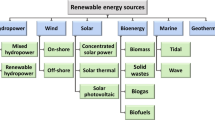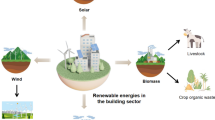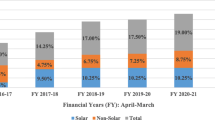Abstract
Improving residential energy efficiency is widely recognised as one of the best strategies for reducing energy demand, combating climate change, and increasing security of energy supply. However, progress has been slow to date due to a number of market and behavioural barriers that have not been adequately addressed by energy efficiency policies and programmes. This study is based on updated findings of the European Futures for Energy Efficiency Project that responds to the EU Horizon 2020 Work Programme 2014–2015 theme ‘Secure, clean and efficient energy’. This article draws on five case studies from selected European countries—Finland, Italy, Hungary, Spain, and the UK—and evaluates recent energy efficiency developments in terms of indicators, private initiatives, and policy measures in the residential sector. Our analysis shows that the UK government has implemented a better range of policies, coupled with initiatives from the private sector, aimed at improving energy efficiency. However, its existing conditions appear to be more problematic than the other countries. On the other hand, the lack of effective and targeted policies in Finland resulted in increased energy consumption, while in Hungary, Spain and Italy some interesting initiatives, especially in terms of financial and fiscal incentives, have been found.





Similar content being viewed by others
Notes
Trotta, Gianluca and Lorek, Sylvia (2018). D5.1. http://www.utu.fi/en/units/euforie/Research/deliverables/PublishingImages/Pages/home/D%205%201%20_Stocktaking_of_instruments_targetting_household_energy_efficiency.pdf
Under the Energy Efficiency Directive, EU countries should set up an energy efficiency obligation scheme. This scheme requires energy companies to achieve yearly energy savings of 1.5% of annual sales to final consumers.
Motiva in Finland, Italian National Agency for New Technologies, Energy and Sustainable Economic Development (ENEA) in Italy, the National Environmental Protection and Energy Center Nonprofit (NKEK) in Hungary, Institute for the Diversification and Saving of Energy (IDEA) in Spain, the Energy Saving Trust (EST) in the UK.
References
Allcott, H., & Greenstone, M. (2012). Is there an energy efficiency gap? The Journal of Economic Perspectives, 26(1), 3–28.
Ameli N. and Brandt, N. (2014). Determinants of households’ investment in energy efficiency and renewables—evidence from the OECD survey on household environmental behaviour and attitudes. OECD Economics Department Working Paper No. 1165, OECD Publishing, Paris. http://www.oecd-ilibrary.org/determinants-of-households-investment-in-energy-efficiency-and-renewables_5jxwtlchggzn.pdf;jsessionid=8eo8i8um6mhl2.x-oecd-live-02?contentType=%2fns%2fWorkingPaper&itemId=%2fcontent%2fworkingpaper%2f5jxwtlchggzn-en&mimeType=application%2fpdf&containerItemId=%2fcontent%2fworkingpaperseries%2f18151973&accessItemIds=&option6=imprint&value6=http%3a%2f%2foecd.metastore.ingenta.com%2fcontent%2fimprint%2foecd
Ameli, N. and Brandt, N. (2015). What impedes household investment in energy efficiency and renewable energy? OECD Economics Department Working Paper No. 1222, OECD Publishing, Paris. http://www.oecd-ilibrary.org/docserver/download/5js1j15g2f8n-en.pdf?expires=1521128385&id=id&accname=guest&checksum=1A458058622727DC56A6CCA315363A1C
Arcipowska, A., Anagnostopoulos, F., Mariottini, F. and Kunkel, S. (2014). Energy performance certificates across the EU. A mapping of national approaches, The Buildings Performance Institute Europe (BPIE). http://bpie.eu/wp-content/uploads/2015/10/Energy-Performance-Certificates-EPC-across-the-EU.-A-mapping-of-national-approaches-2014.pdf
Aydin, E., Kok, N., & Brounen, D. (2017). Energy efficiency and household behavior: the rebound effect in the residential sector. The Rand Journal of Economics, 48(3), 749–782.
Bertoldi, P. (2017). Are current policies promoting a change in behaviour, conservation and sufficiency? An analysis of existing policies and recommendations for new and effective policies. In ECEEE Summer Study (pp. 201–211). Toulon: ECEEE. https://www.eceee.org/library/conference_proceedings/eceee_Summer_Studies/2017/1-foundations-of-future-energy-policy/are-current-policies-promoting-a-change-in-behaviour-conservation-and-sufficiency-an-analysis-of-existing-policies-and-recommendations-for-new-and-effective-policies/2017/1-362-17_Bertoldi.pdf/
Bertoldi, P., & Boza-Kiss, B. (2017). Analysis of barriers and drivers for the development of the ESCO markets in Europe. Energy Policy, 107, 345–355.
Bertoldi, P. and Economidou, M. (2016). The assessment of the Member States National Energy Efficiency Action plans: will the EU reach the 2020 target? International Energy Policy and Programme Evaluation Conference 2016. http://www.ieppec.org/wp-content/uploads/2016/05/Paper-Bertoldi-2.pdf
Bertoldi, P., Boza-Kiss, B., Panev, S. and Labanca, N. (2014). ESCO Market Report 2013. http://publications.jrc.ec.europa.eu/repository/bitstream/JRC89550/jrc_89550_the%20european%20esco%20market%20report%202013_online.pdf
Bertoldi, P., Castellazzi, L., Spyridaki, N. A. and Fawcett, T. (2015). How is Article 7 of the Energy Efficiency Directive being implemented? An analysis of national energy efficiency obligation schemes. ECEEE 2015 Summer Study proceedings, 455–465. https://www.eceee.org/library/conference_proceedings/eceee_Summer_Studies/2015/2-energy-efficiency-policies-8211-how-do-we-get-it-right/how-is-article-7-of-the-energy-efficiency-directive-being-implemented-an-analysis-of-national-energy-efficiency-obligations-schemes/2015/2-380-15_Bertoldi.pdf/
Bleischwitz, R., Bahn-Walkowiak, B., Irrek, W., Schepelmann, P., Schmidt-Bleek, F., Giljum, S Lutter, S., Bohunovski, L., Hinterberger, F., Hawkins, E., Kuhndt, M. and Pratt, N. (2009). Eco-innovation-putting the EU on the path to a resource and energy efficient economy. Wuppertal Spezial No. 38, Wuppertal Institut für Klima, Umwelt und Energie, Wuppertal. https://epub.wupperinst.org/frontdoor/deliver/index/docId/3433/file/WS38.pdf
Bouzarovski, S. (2014). Energy poverty in the European Union: landscapes of vulnerability. Wiley Interdisciplinary Reviews: Energy and Environment, 3(3), 276–289.
Broin, E. Ó., Nässén, J., & Johnsson, F. (2015). Energy efficiency policies for space heating in EU countries: a panel data analysis for the period 1990-2010. Applied Energy, 150, 211–223.
Brown, M. A., & Wang, Y. (2017). Energy-efficiency skeptics and advocates: the debate heats up as the stakes rise. Energy Efficiency, 10(5), 1155–1173.
Chai, K. H., & Yeo, C. (2012). Overcoming energy efficiency barriers through systems approach—a conceptual framework. Energy Policy, 46, 460–472.
Climate Change Committee (2016). Next steps for UK heat policy. London, Climate Change Committee. https://www.theccc.org.uk/wp-content/uploads/2016/10/Next-steps-for-UK-heat-policy-Committee-on-Climate-Change-October-2016.pdf
Concerted Action Energy Efficiency Directive (2014). Designing measures for behavioural change. http://www.ca-eed.eu/private-area/themes/consumer-information-ct6/Executive-Summary-6.3-Designing-measures-for-behavioural-change
Concerted Action Energy Efficiency Directive (2016). National EED Implementation Reports (NIR). http://www.ca-eed.eu/private-area/outcomes/national-eed-implementation-reports/national-implementation-report-2016-consolidated-document
Danlami, A. H., Islam, R., & Applanaidu, S. D. (2015). An analysis of the determinants of households’ energy choice: a search for conceptual framework. International Journal of Energy Economics and Policy, 5(1), 197.
Department for Communities and Local Government (2015). English Housing Survey Headline Report 2014–15. https://www.gov.uk/government/uploads/system/uploads/attachment_data/file/501065/EHS_Headline_report_2014-15.pdf
Department of Energy and Climate Change (2016a). Warm Home Discount Scheme. https://www.gov.uk/government/uploads/system/uploads/attachment_data/file/514324/Final_Warm_Home_Discount_consultation_for_publication.pdf
Department of Energy and Climate Change (2016b). Private rented sector tenants’ energy efficiency improvements provisions. Guidance for landlords and tenants of domestic property on Part Two of the Energy Efficiency (Private Rented Property) (England and Wales) Regulations 2015. https://www.gov.uk/government/uploads/system/uploads/attachment_data/file/508180/2016_01_19__PRS_tenants__energy_efficiency_improvements_guidance.pdf
Dowson, M., Poole, A., Harrison, D., & Susman, G. (2012). Domestic UK retrofit challenge: Barriers, incentives and current performance leading into the Green Deal. Energy Policy, 50, 294–305.
EC (2015). Energy Performance of Buildings Directive (EPBD) Compliance Study. https://ec.europa.eu/energy/sites/ener/files/documents/MJ-04-15-968-EN-N.pdf
EC (2016a). Proposal for a Directive of the European Parliament and of the Council amending Directive 2012/27/EU on Energy Efficiency. http://eur-lex.europa.eu/legal-content/EN/TXT/PDF/?uri=CELEX:52016SC0405R(01)&from=EN
EC (2016b). Good practice in energy efficiency COM(2016) 761 final. http://ec.europa.eu/energy/sites/ener/files/documents/5_en_autre_document_travail_service_part1_v4.pdf
EC (2016c). Regulation of the European Parliament and of the Council on the Governance of the Energy Union. http://ec.europa.eu/energy/sites/ener/files/documents/1_en_act_part1_v9_759.pdf
Economidou, M. (2014). Overcoming the split incentive barrier in the building sector. In Workshop summary. Institute for environment and sustainability, European Commission DG Joint Research Centre, Ispra, Italy. http://publications.jrc.ec.europa.eu/repository/bitstream/JRC90407/2014_jrc_sci_pol_rep_cov_template_online_final.pdf
Economidou, M., Bertoldi, P. (2018). Assessment of the National Energy Efficiency Action Plans 2017 under the Energy Efficiency Directive. 2018 International Energy Policy & Programme Evaluation Conference, 25–27 June, Vienna, Austria. http://www.ieppec.org/wp-content/uploads/2018/06/Bertoldi_paper_vienna.pdf
ENEA (2016). Italy’s energy efficiency annual report. http://www.enea.it/it/seguici/pubblicazioni/pdf-volumi/executive-summary-2016-eng.pdf
ENSPOL (2015a). Energy Saving Policies and Energy Efficiency Obligation Scheme. D2.1.2: Report on Context Profiles of EU MS countries—Part III: Context analysis of countries with existing/planned EEOs. http://enspol.eu/sites/default/files/results/D2.1.2%20Report%20on%20Context%20Profiles%20of%20EU%20MS%20countries%20-%20Part%20III%20Context%20analysis%20of%20countries%20with%20EEOs.pdf?v=2
ENSPOL (2015b). Energy Saving Policies and Energy Efficiency Obligation Scheme. D2.1.1: Report on existing and planned EEOs in the EU—Part I: Evaluation of existing schemes. Italy. http://www.article7eed.eu/images/pdf/Existing%20and%20planned%20EEOs%20in%20Italy%20_%20Part%20I%20Evaluation%20of%20existing%20schemes.pdf
Eurostat (2017). Distribution of population by tenure status, type of household and income group. http://appsso.eurostat.ec.europa.eu/nui/show.do?dataset=ilc_lvho02&lang=en
Fawcett, T., Rosenow, J., & Bertoldi, P. (2018). Energy efficiency obligation schemes: their future in the EU. Energy Efficiency, 1–15.
Fawkes, S. (2016). Energy efficiency: the definitive guide to the cheapest, cleanest, fastest source of energy. Routledge.
Fellegi, D., Fülöp, O. (2012). Szegénység vagy energias-zegénység? Az energiaszegénység definiálása Európában és Magyarországon. ENERGIAKLUB Szakpolitikai Intézet és Módszertani Központ, Budapest, Hungary. pp. 26. [Poverty or energy poverty? Defining energy poverty in Europe and Hungary] https://energiaklub.hu/sites/default/files/energiaklub_szegenyseg_vagy_energiaszegenyseg.pdf
Ferraro, P. J. (2009). Counterfactual thinking and impact evaluation in environmental policy. New Directions for Evaluation, 2009(122), 75–84.
Filippini, M., Hunt, L. C., & Zorić, J. (2014). Impact of energy policy instruments on the estimated level of underlying energy efficiency in the EU residential sector. Energy Policy, 69, 73–81.
Frederiks, E. R., Stenner, K., & Hobman, E. V. (2015a). Household energy use: applying behavioural economics to understand consumer decision-making and behaviour. Renewable and Sustainable Energy Reviews, 41, 1385–1394.
Frederiks, E. R., Stenner, K., & Hobman, E. V. (2015b). The socio-demographic and psychological predictors of residential energy consumption: a comprehensive review. Energies, 8(1), 573–609.
Fülöp, O., & Kun, Z. (2014). Lakossági Energiahatékonysági Barométer 2014. Budapest, Hungary: ENERGIAKLUB Szakpolitikai Intézet és Módszertani Központ https://energiaklub.hu/sites/default/files/lakossag_energiahatekonysagi_barometer_2014_energiaklub.pdf.
Galvin, R. (2014). Estimating broad-brush rebound effects for household energy consumption in the EU 28 countries and Norway: some policy implications of Odyssee data. Energy Policy, 73, 323–332.
Gerarden, T. D., Newell, R. G., & Stavins, R. N. (2017). Assessing the energy-efficiency gap. Journal of Economic Literature, 55(4), 1486–1525.
Gillingham, K., & Palmer, K. (2014). Bridging the energy efficiency gap: policy insights from economic theory and empirical evidence. Review of Environmental Economics and Policy, 8(1), 18–38.
Gillingham, K., Newell, R. G., & Palmer, K. (2009). Energy efficiency economics and policy. Annu. Rev. Resour. Econ., 1(1), 597–620.
GSE (2015). Relazione sul funzionamento del Conto Termico giugno 2013 - dicembre 2014. http://www.gse.it/it/Conto%20Termico/GSE_Documenti/Relazione%20Conto%20Termico_2013-2014.pdf
GSE (2016). Relazione sul funzionamento del Conto Termico gennaio - dicembre 2015. http://www.gse.it/it/Conto%20Termico/GSE_Documenti/Relazione%20Conto%20Termico_2015.pdf
Haney, A. B., Jamasb, T., Platchkov, L. M., & Pollitt, M. G. (2010). Demand-side management strategies and the residential sector: lessons from international experience. http://www.econ.cam.ac.uk/research-files/repec/cam/pdf/cwpe1060.pdf
Hannon, M. J., Foxon, T. J., & Gale, W. F. (2013). The co-evolutionary relationship between Energy Service Companies and the UK energy system: implications for a low-carbon transition. Energy Policy, 61, 1031–1045.
Huebner, G. M., Hamilton, I., Chalabi, Z., Shipworth, D., & Oreszczyn, T. (2015). Explaining domestic energy consumption—the comparative contribution of building factors, socio-demographics, behaviours and attitudes. Applied Energy, 159, 589–600.
Hungary’s National Energy Efficiency Action Plan until 2020 (2014). https://ec.europa.eu/energy/sites/ener/files/documents/hungaryActionPlan2014_en.pdf
IEA (2005). Evaluating energy efficiency policy measures & DSM programmes Volume I Evaluation Guidebook.OECD/IEA,Paris. http://www.ieadsm.org/wp/files/Exco%20File%20Library/Key%20Publications/Volume1Total.pdf
IEA (2011). Energy efficiency policy and carbon pricing. OECD/IEA, Paris. https://www.iea.org/publications/freepublications/publication/EE_Carbon_Pricing.pdf
IEA (2014a) Capturing the multiple benefits of energy efficiency. OECD/IEA, Paris. http://www.iea.org/publications/freepublications/publication/Captur_the_MultiplBenef_ofEnergyEficiency.pdf
IEA (2014b). Energy efficiency indicators: fundamentals on statistics. OECD/IEA, Paris. https://www.iea.org/publications/freepublications/publication/IEA_EnergyEfficiencyIndicatorsFundamentalsonStatistics.pdf
IEA (2014c). Energy efficiency indicators: essentials for policy making. OECD/IEA, Paris. https://www.iea.org/publications/freepublications/publication/IEA_EnergyEfficiencyIndicators_EssentialsforPolicyMaking.pdf
Irrek, W., Bertoldi, P., Labanca, N., & Suerkemper, F. (2013). ESCOs for residential buildings: market situation in the European Union and policy recommendations. https://www.eceee.org/library/conference_proceedings/eceee_Summer_Studies/2013/5a-cutting-the-energy-use-of-buildings-projects-and-technologies/escos-for-residential-buildings-market-situation-in-the-european-union-and-policy-recommendations/2013/5A-524-13_Irrek.pdf/
Italy’s National Energy Efficiency Action Plan (2014). https://ec.europa.eu/energy/sites/ener/files/documents/2014_neeap_en_italy.pdf
Jaffe, A. B., & Stavins, R. N. (1994). The energy-efficiency gap: what does it mean? Energy Policy, 22(10), 804–810.
Kallbekken, S., Sælen, H., & Hermansen, E. A. (2013). Bridging the energy efficiency gap: a field experiment on lifetime energy costs and household appliances. Journal of Consumer Policy, 36(1), 1–16.
Knoop, K., & Lechtenböhmer, S. (2017). The potential for energy efficiency in the EU Member States—a comparison of studies. Renewable and Sustainable Energy Reviews, 68, 1097–1105.
Labanca, N., Suerkemper, F., Bertoldi, P., Irrek, W., & Duplessis, B. (2015). Energy efficiency services for residential buildings: market situation and existing potentials in the European Union. Journal of Cleaner Production, 109, 284–295.
Lopes, M. A. R., Antunes, C. H., & Martins, N. (2012). Energy behaviours as promoters of energy efficiency: a 21st century review. Renewable and Sustainable Energy Reviews, 16(6), 4095–4104.
Lorenzen, J. A. (2012). Going green: the process of lifestyle change. In Sociological Forum (Vol. 27, No. 1, pp. 94–116). Blackwell Publishing Ltd,.
Marino, A., Bertoldi, P., Rezessy, S., & Boza-Kiss, B. (2011). A snapshot of the European energy service market in 2010 and policy recommendations to foster a further market development. Energy Policy, 39(10), 6190–6198.
Mills, B., & Schleich, J. (2012). Residential energy-efficient technology adoption, energy conservation, knowledge, and attitudes: an analysis of European countries. Energy Policy, 49, 616–628.
Noailly, J. (2012). Improving the energy efficiency of buildings: The impact of environmental policy on technological innovation. Energy Economics, 34, 795–806.
OFGEM. (2002). Energy Efficiency Commitment 2002-2005 Technical Guidance Manual. London, UK: Office of the Gas and Electricity Markets. https://www.ofgem.gov.uk/ofgem-publications/58659/135-oct2002pdf. Accessed 9 Jan 2017.
OFGEM. (2008). Carbon Emissions Reduction Target (CERT) 2008-2011 Technical Guidance Manual. London, UK: Office of the Gas and Electricity Markets. https://www.ofgem.gov.uk/ofgem-publications/58721/tm-guidancepdf. Accessed 9 Jan 2017.
OFGEM. (2009). Community Energy Saving Programme 2009 - 2012 Generator and Supplier Guidance. London, UK: Office of the Gas and Electricity Markets. https://www.ofgem.gov.uk/sites/default/files/docs/2009/11/cesp-generator-and-supplier-guidance.pdf. Accessed 9 Jan 2017.
OFGEM, & Energy Saving Trust. (2003). A review of the energy efficiency standards of performance 1994–2002. London, UK: Office of the Gas and Electricity Markets. https://www.ofgem.gov.uk/ofgem-publications/58653/4211-eesopreportjuly03pdf. Accessed 9 Jan 2017.
Odyssee database, (2017). Database on the energy consumption drivers by end-use, energy efficiency and CO2 related indicators. http://www.odyssee-indicators.org/database/database.php (subscription-based).
Pätäri, S., & Sinkkonen, K. (2014). Energy Service Companies and Energy Performance Contracting: is there a need to renew the business model? Insights from a Delphi study. Journal of Cleaner Production, 66, 264–271.
Pollitt, M. G., & Shaorshadze, I. (2011). The role of behavioural economics in energy and climate policy. https://www.repository.cam.ac.uk/bitstream/handle/1810/257212/cwpe1165.pdf?sequence=1&isAllowed=y
Polytechnic University of Milan (2017). Energy Efficiency Report. La filiera dell’Efficienza Energetica in Italia. Energy & Strategy Group. http://www.energystrategy.it/assets/files/EER_17_conCover_alta.pdf
Poortinga, W., Jiang, S., Grey, C., & Tweed, C. (2017). Impacts of energy-efficiency investments on internal conditions in low-income households. Building Research & Information, 1–15.
Rosenow, J. (2012). Energy savings obligations in the UK—a history of change. Energy Policy, 49, 373–382.
Rosenow, J., & Eyre, N. (2013). The green deal and the energy company obligation. Proceedings of the Institution of Civil Engineers-Energy, 166(3), 127–136.
Rosenow, J., & Eyre, N. (2015). Re-energising the UK’s approach to domestic energy efficiency. In Proceedings of ECEEE Summer Study (pp. 281–289). http://eng.janrosenow.com/uploads/4/7/1/2/4712328/2-001-15_rosenow.pdf
Rosenow, J., Platt, R., & Flanagan, B. (2013). Fuel poverty and energy efficiency obligations—a critical assessment of the supplier obligation in the UK. Energy Policy, 62, 1194–1203.
Rosenow, J., Fawcett, T., Eyre, N., & Oikonomou, V. (2016). Energy efficiency and the policy mix. Building Research & Information, 44(5–6), 562–574.
Sallee, J. M. (2014). Rational Inattention and Energy Efficiency. The Journal of Law and Economics 57 (3):781–820.
Samadi, S., Gröne, M. C., Schneidewind, U., Luhmann, H. J., Venjakob, J., & Best, B. (2017). Sufficiency in energy scenario studies: taking the potential benefits of lifestyle changes into account. Technological Forecasting and Social Change, 124, 126–134.
Santin, O. G., Itard, L., & Visscher, H. (2009). The effect of occupancy and building characteristics on energy use for space and water heating in Dutch residential stock. Energy and Buildings, 41(11), 1223–1232.
Saussay, A., Saheb, Y., & Quirion, P. (2012). The impact of building energy codes on the energy efficiency of residential space heating in European countries—a stochastic frontier approach. In International Energy Program Evaluation Conference. Rome. http://www.iepec.org//conf-docs/papers/2012PapersTOC/papers/053.pdf#page=1
Schleich, J., & Gruber, E. (2008). Beyond case studies: barriers to energy efficiency in commerce and the services sector. Energy Economics, 30(2), 449–464.
Slezák, J., Vadovics, E., Trotta, G., Lorek, S. (2015). Consumers and energy efficiency—country Report for Hungary. An inventory of policies, business and civil initiatives at the national level, focusing on heating, hot water and the use of electricity. December, 2015. EUFORIE - European Futures for Energy Efficiency. http://www.utu.fi/en/units/euforie/Research/deliverables/country-reports/PublishingImages/Pages/home/EUFORIE%20D%205%201%20%20Country%20Report%20Hungary.pdf
Sorrell, S. (2015). Reducing energy demand: a review of issues, challenges and approaches. Renewable and Sustainable Energy Reviews, 47, 74–82.
Sovacool, B. K. (2009). The importance of comprehensiveness in renewable electricity and energy-efficiency policy. Energy Policy, 37(4), 1529–1541.
Spain’s National Energy Efficiency Action Plan (2014). https://ec.europa.eu/energy/sites/ener/files/documents/2014_neeap_en_spain.pdf
Spangenberg, Joachim (2018). D5.2—Identification of promising instruments and instrument mixes for energy efficiency. EUFORIE—European Futures for Energy Efficiency. http://www.utu.fi/en/units/euforie/Research/deliverables/Documents/D5%202%20Identification%20of%20promising%20instruments%20and%20instrument%20mixes%20for%20energy%20efficiency.pdf
Stern, P. C. (1992). What psychology knows about energy conservation. American Psychologist, 47(10), 1224–1232.
Sudarshan, A. (2013). Deconstructing the Rosenfeld curve: making sense of California’s low electricity intensity. Energy Economics, 39, 197–207.
Team, A., & Baffert, C. (2015). Energy poverty and vulnerable consumers in the energy sector across the EU: analysis of policies and measures. Policy, 2.
Thøgersen, J. (2017). Housing-related lifestyle and energy saving: a multi-level approach. Energy Policy, 102, 73–87.
Thomas, S., Brischke, L. A., Thema, J., & Kopatz, M. (2015). Energy sufficiency policy: an evolution of energy efficiency policy or radically new approaches?. Wuppertal Institut für Klima, Umwelt, Energie. https://epub.wupperinst.org/frontdoor/deliver/index/docId/5922/file/5922_Thomas.pdf
Trotta, G. (2018a). The determinants of energy efficient retrofit investments in the English residential sector. Energy Policy, 120, 175–182.
Trotta, G. (2018b). Factors affecting energy-saving behaviours and energy efficiency investments in British households. Energy Policy, 114, 529–539.
Trotta, Gianluca and Lorek, Sylvia (2018). D5.1—Consumers and Energy Efficiency—stock taking of policy instruments targeting household energy efficiency. EUFORIE—European Futures For Energy Efficiency. http://www.utu.fi/en/units/euforie/Research/deliverables/PublishingImages/Pages/home/D%205%201%20_Stocktaking_of_instruments_targetting_household_energy_efficiency.pdf.
UNFCCC (2016). Techincal expert meeting. Session SBI45 (2016). https://unfccc.int/files/focus/mitigation/the_multilateral_assessment_process_under_the_iar/application/pdf/sbi45_hun_session_final_result.pdf
York, C. M. (1978). Bibliography on institutional barriers to energy conservation. Lawrence Berkeley National Laboratory. https://cloudfront.escholarship.org/dist/prd/content/qt5vh2f55z/qt5vh2f55z.pdf
Acknowledgements
The authors would like to thank József Slezák and Edina Vadovics for the information provided about Hungary, and the participants of the ‘3rd RSEP Multidisciplinary Conference’ (April 5–7, 2017) in Vienna and the ‘Biennial International Workshop Advances in Energy Studies’ (September 25–28, 2017) in Naples for their comments. We are also thankful to the anonymous reviewers for their valuable comments on the earlier version of this paper.
Funding
This work has been supported by the European Commission under the project grant EUFORIE/H2020-EE-2014-2015-RIA/649342.
Author information
Authors and Affiliations
Corresponding author
Ethics declarations
Conflict of interest
The authors declare that they have no conflict of interest.
Electronic supplementary material
ESM 1
(XLSX 21 kb)
Rights and permissions
About this article
Cite this article
Trotta, G., Spangenberg, J. & Lorek, S. Energy efficiency in the residential sector: identification of promising policy instruments and private initiatives among selected European countries. Energy Efficiency 11, 2111–2135 (2018). https://doi.org/10.1007/s12053-018-9739-0
Received:
Accepted:
Published:
Issue Date:
DOI: https://doi.org/10.1007/s12053-018-9739-0




